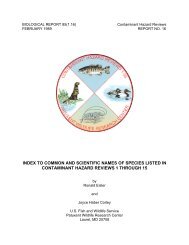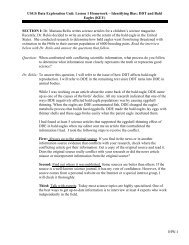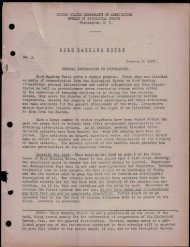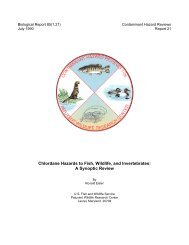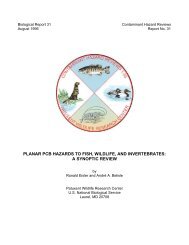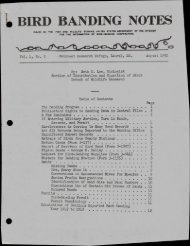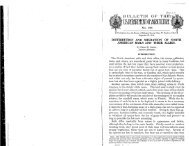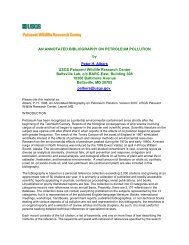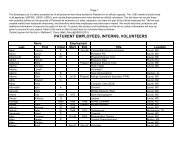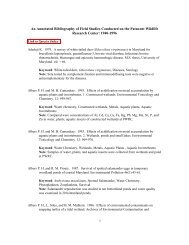Second North American Sea Duck Conference - Patuxent Wildlife ...
Second North American Sea Duck Conference - Patuxent Wildlife ...
Second North American Sea Duck Conference - Patuxent Wildlife ...
You also want an ePaper? Increase the reach of your titles
YUMPU automatically turns print PDFs into web optimized ePapers that Google loves.
SECOND NORTH AMERICAN SEA DUCK CONFERENCE<br />
FEMALE-BASED KIN GROUPS<br />
IN THE COMMON EIDER<br />
Laura McKinnon, Kim Scribner, and Grant Gilchrist<br />
Department of Zoology, Michigan State University; l_mck@hotmail.com, mckinn98@msu.edu<br />
The adaptiveness of social behaviors such as group living can be explained by the concept of inclusive<br />
fitness when kin relationships exist between individuals within groups. We investigated the presence<br />
of kin-based female sociality in the common eider (Somateria mollisima). Previous studies of female<br />
sociality in common eiders have been restricted to observations during colony departure and brood<br />
rearing, despite the fact that females may associations occur at several previous stages including colony<br />
arrival and nest site selection. Here we provide a novel, empirical framework using molecular markers<br />
and field sampling to investigate female social groups at several stages of the common eider life cycle.<br />
Blood samples were collected from females captured in naturally occurring groups during colony<br />
arrival and colony departure. Genetic data for females was also collected during the nesting season<br />
via post-hatch collection of nesting material from monitored nests with known dates of nest initiation.<br />
When compared to mean estimates of inter-individual relatedness for the entire colony, significantly<br />
higher levels of relatedness were found between females within groups upon colony arrival, between<br />
females and nearest neighbors during nest site selection and between females within groups departing<br />
the colony with ducklings. Both full-sibling and half-sibling equivalent relationships were found within<br />
these groups at all three stages. Here we have provided the first genetically confirmed evidence of kinbased<br />
social groups in female common eiders and sea ducks in general. Further research directed at<br />
measuring fitness benefits of sociality in common eiders and other sea ducks could provide invaluable<br />
insight into the evolution of sociality in these species.<br />
NOV. 7-11, 2005 ANNAPOLIS, MARYLAND, USA<br />
67



